Business Africa
A big week for African economies as the Paris summit on African economies took place on May 18.
In this episode of Business Africa, we look at the ambitious solutions to help the continent cope with the shock caused by the coronavirus pandemic.
There is a demand for funding based on decentralized cooperation - would this model help boost the development of African economies?
And finally, we venture to Djibouti, the country has decided to industrialize fishing, but the sector suffers from a lack of funding.
You can watch the full episode in the video player above.
Several economists on the continent believe that African solutions must be found to African problems to achieve the economic development that our states dream of.
World Trade Organisation's Luanga Mukela says Africa must rethink its approach to financing development.
"We [Africa] cannot finance development with our small resources which don't match our many needs. We must think differently," Lukela said in an interview with africanews on the sidelines of the Paris summit.
Presenter Ruth Lago speaks to two economists.
Togo's, Kako Nubukpo, economist and special advisor to the president of the West African Economic and Monetary Union and also Congo's, Noel Tshani, based in the United States, Founder Congo Business Network and the company Agere Global.
Question: Mr. Nubukpo, what are the solutions to be considered to achieve better economic development in Africa?
"This is the thesis that I presented in my last book, The African emergency, the subtitle of which was let's change the growth model, that is to say that you cannot succeed in the structural transformation of your savings only if you agree to develop the secondary sector, which helps the industrial sector.
"However, when you observe today, over the last 30 years, the jobs created in Africa out of ten jobs created in Africa, you have six in the rural agricultural sector. You have three in the tertiary sector and you have only one in the industrial sector. And therefore, it is absolutely necessary to transform the raw materials. This is how we can create value, how we can create jobs. And that's how we can hope to solve the problem of massive unemployment for our young people.
Question: Mr. Noel Tshani, how do you answer the question, should we have a common economic model for Africa?
"No, no, I don't think we have to go with a universal model that applies from Tunisia to South Africa. Why do we tend to see Africa as a country?Africa is made up of 54 countries that have different cultures, different languages and the business environment which is different too. So you have to go with a personalized model at a local level, not even at the country level, but at the provincial level or even at the city level."
Question: So should the economic development of Africa be decided in Paris or in Africa, how do we get out of the old model?
Mr. Nubukpo: "We have no choice, we grow where have perished, You have a continent where the population doubles every 25 years or the median age is 15, where two-thirds of the population is under 35. So you have to give these young people the opportunity to access employment. But the people are not going to die in silence. And so, you're going to have cycles of instability that won't be manageable. Not just for Africa, but for the whole planet.
"And that is why it is imperative today to understand that the future of Africa is its internal market and therefore the monetary and financial issue. It is the financing of the African domestic market. We can no longer continue the model we have had for a century, ie serving our raw materials to the rest of the world. It can't go on anymore. So, whatever the meetings, summits, seminars, gatherings that will be carried out, we will not escape this situation which is the creation of jobs on the continent."
Question: To achieve this development Mr. Tshani must still resort to loans when countries are dragging debts already considered unsustainable by some international financial organizations?
Mr. Tshani: "The problem is not the debt or the level of debt. The problem is the management of this debt and the African countries. Why is debt badly managed? Because our people who are in politics or who have positions in politics use this kind of position .., it becomes like private companies, taking money to put in their pocket and give to their families.
"This is where the problem lies. So the problem is not borrowing more and more the problem is managing the current debt and ensuring that when there are donations from common countries such as France, the United States or other countries, These donations go to a few projects which are necessary and ensure that there is real development."
Question: Mr. Nubupko, do you agree: Debt is not a problem. The problem is, what do we do with the debt?
"If you are funding the structural transformation of economies, that is a very good thing. Now, if you fund consumption that doesn't empower you or empower yourself and someday, well you're going to be in a vicious cycle. And so, all that matters is the vision."





![E-commerce: Can Covid growth be sustained? [Business Africa]](https://static.euronews.com/articles/stories/05/62/32/50/320x180_cmsv2_b710e46c-a24e-585d-9ba6-384c62ca7772-5623250.jpg)
![eSwatini's economy risk crashing [Business Africa]](https://static.euronews.com/articles/stories/05/59/11/86/320x180_cmsv2_4c508051-2308-5c00-8a14-1ef62a43dd6e-5591186.jpg)
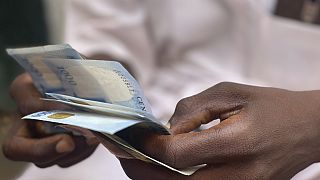
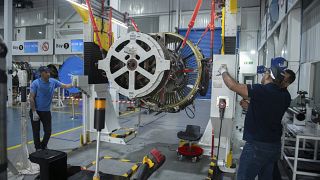

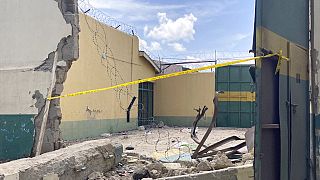
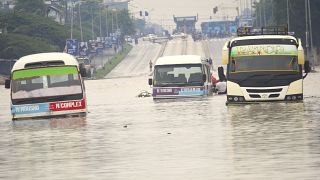
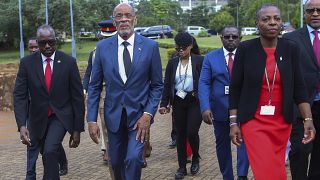
11:08
Is Africa’s soil healthy enough for food security? [Business Africa]
01:09
Tanzania: Death toll from flooding rises to 155 as heavy rains continue in Eastern Africa
Go to video
Kenyan government recommends regulating, not banning TikTok
Go to video
Over 100 inmates break free from a Nigerian prison after heavy rains
Go to video
Cote d’Ivoire health workers bike to combat malaria in villages
Go to video
Ghana's vice President, Bawumia meets Pope Francis in historic Vatican visit